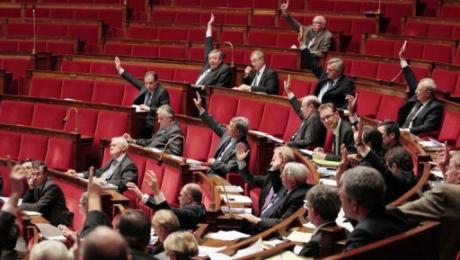 (ACF) On December 22, the National Assembly of France adopted a law proposition criminalizing the negation of Genocides acknowledged as such by the French law.
(ACF) On December 22, the National Assembly of France adopted a law proposition criminalizing the negation of Genocides acknowledged as such by the French law.
During the four-hour session, the overwhelming majority of the deputies wholeheartedly supported the need to protect by law the French people, the Genocide victims and the democratic values that run the Republic of France from acts of hatred and intolerance. “I will vote thinking of Hrant Dink,” said one Member of Parliament as he concluded his remarks. “We are not punishing any country, but we are fighting against genocide denial in our country,” said another. “We are taking part in the mass destruction of Armenians when we allow its denial… We are voting in the name of Armenians who sought refuge here. How can we look in the eyes of our fellow citizens of Armenian heritage, while we know that there are those among us who deny the suffering of their grandparents?” said yet another Member of Parliament. “Racism is not an opinion, it’s a crime,” said another.
The no. 813 law proposition of the National Assembly is based on the 29/7/1881 law of France and additionally it serves harmonizing with the 2008/913/JHA EU Council framework decision on combating certain forms and expressions of racism and xenophobia by means of criminal law and incorporating it into the French jurisprudence.
The legislative power of France consistent with its convictions illustrated in the 2001-70 law (29/1/2001) with which France has recognized the Genocide perpetrated in 1915 against the Armenians reaffirmed once more its position as human rights’ pioneer defender. The penalties provisioned in the law proposition are a year in jail and a fine of 45.000 euros.
The legislative procedure requires that the law proposition be submitted to the Senate for approval and afterwards be signed by the President of France.
Below is the original and the translation of the no 813 law proposition:
The National Assembly adopted a law proposition with the following content:
Look numbers 3842 and 4035.
Article 1
The 1st paragraph of the IV chapter of the 29 July 1881 law on the freedom of press is completed by an Article 24 ter composed as follows:
“Art. 24 ter.- The penalties provisioned in Article 24 bis are applicable upon those who by the use of any of the means stated in article 23 contest or minimize in an excessive manner the existence of one or more crimes of genocide defined in the article 211-1 of the penal code and acknowledged as such by the French law.
Furthermore, the court can order the display or the diffusion of the adjudged decision under the conditions provisioned in the article 131-35 of the penal code.”
Article 2
The Article 48-2 of the same law is modified as follows:
1. After the word “deported” the following words are inserted: “ or all the other victims of crimes of genocide, crimes of war, crimes against humanity or of crimes or offences of collaboration with the enemy”,
2. At the end, the words: “the infringement provisioned by the article 24 bis” are replaced by the words “the infringements provisioned in the articles 24 bis and 24 ter”.
Public Session resolution, Paris 22 December 2011
L’Assemblée nationale a adopté la proposition de loi dont la teneur suit :
Voir les numéros : 3842 et 4035.
Article 1er
Le paragraphe 1er du chapitre IV de la loi du 29 juillet 1881 sur la liberté de la presse est complété par un article 24 ter ainsi rédigé :
« Art. 24 ter. – Les peines prévues à l’article 24 bis sont applicables à ceux qui ont contesté ou minimisé de façon outrancière, par un des moyens énoncés à l’article 23, l’existence d’un ou plusieurs crimes de génocide défini à l’article 211-1 du code pénal et reconnus comme tels par la loi française.
« Le tribunal peut en outre ordonner l’affichage ou la diffusion de la décision prononcée, dans les conditions prévues à l’article 131-35 du code pénal. »
Article 2
L’article 48-2 de la même loi est ainsi modifié :
1° Après le mot : « déportés », sont insérés les mots : « , ou de toute autre victime de crimes de génocide, de crimes de guerre, de crimes contre l’humanité ou de crimes ou délits de collaboration avec l’ennemi » ;
2° À la fin, les mots : « l’infraction prévue par l’article 24 bis » sont remplacés par les mots : « les infractions prévues aux articles 24 bis et 24 ter ».
Délibéré en séance publique, à Paris, le 22 décembre 2011.